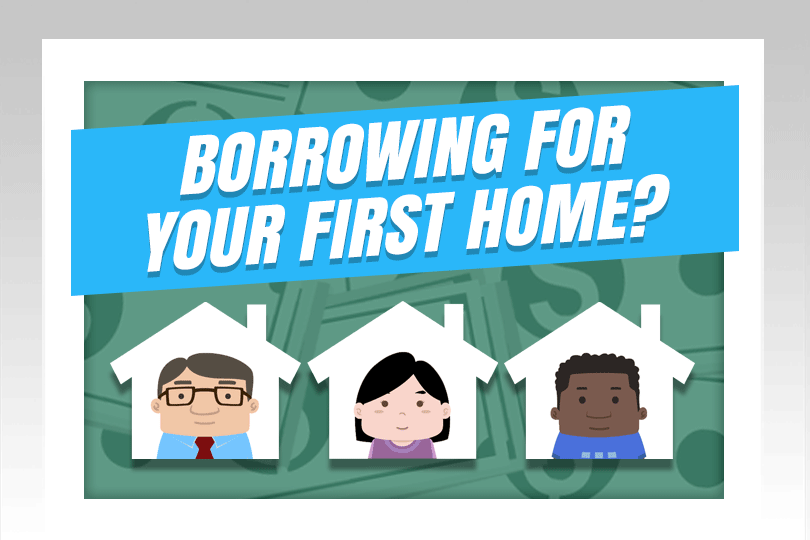Fixed Rate Versus Adjustable-Rate Mortgages
March 21, 2021
A Fixed Rate Loan is one with an interest rate that stays the same for the entire life of the loan. Your principal and interest amount changes from month to month as you pay down the loan, but the total amount you pay in interest is final, making it easier to budget and plan. With a fixed rate home loan, your amortization schedule is clear and complete.
An Adjustable-Rate Mortgage, commonly referred to as an ARM, gets more complicated. An ARM has an interest rate that changes over the loan term. The rate is set below the market rate for an initial, introductory period, which could be up to 10 years. After this initial period ends, the ARM will adjust.
To fully understand how an ARM works, there are a few key terms you will need to know:
- Adjustment Index: The interest rate adjustments on your ARM are dependent on an index that your lender uses as a benchmark. The FHA accepts market index figures of the Constant Maturity Treasury (CMT) index or the 1-year London Interbank Offered Rate (LIBOR).
- Adjustment Frequency. This is the between each interest-rate adjustment. For example, the FHA’s ARMs adjust annually.
- Margin: This is the number that is added to the index rate to determine your interest rate and is disclosed when you sign your loan.
Which One Works for Me?
There are pros and cons to both, the fixed rate loan, and the ARM. A fixed rate mortgage gives borrowers security of knowing how much they owe and the freedom to plan and budget for the future. However, this also means that they can be stuck paying a higher rate in a few years when the market rates drop, unless they choose to refinance.
With its lower interest payments, an ARM is considerably cheaper than a fixed rate mortgage, at least while the introductory fixed-rate period lasts. But borrowers are taking on the risk of a fluctuating market with rising rates in the future.
So which loan type is best? It comes down to each borrower’s needs and plan for the future. It helps to as yourself some questions when deciding.
How much can you afford?
If you are thinking about an ARM, it is important to be realistic. Run the numbers for a worst-case scenario and calculate your highest possible monthly payment. You might need to save during the initial low-interest period and put money away in case rates go up, or even make larger payments during that time so that the total loan is smaller when the interest rate adjustment occurs.
How long will you live in the home?
If this is your starter home, and you only intend to live there for a short amount of time anyway, it makes sense to sign up for an adjustable-rate mortgage and take advantage of the low rates during the introductory period.
In what direction are interest rates heading?
Talk to your loan officer and get their opinion on the market rates. Study trends and decide whether you can take on the risk.
Once you evaluate your needs and answer these questions for yourself, you will have a clearer idea of which option to choose. The FHA offers fixed and adjustable-rate loan options to borrowers and has the same qualification guidelines for both types. Contact your loan officer to take the first step!
------------------------------
RELATED VIDEOS:
Your Mortgage Payment Schedule Is Called Amortization
Information About the Balloon Payment
Reliable Borrowers Can Qualify for a Cash-Out Refinance

FHA Loan Articles
November 21, 2024The dream of homeownership is with some from a young age. But in an uncertain housing market, some grapple with the question: Is buying a home the right move for me?
While renting offers relocation flexibility and lower upfront costs, homeownership provides a wealth of financial and personal benefits.
November 20, 2024Refinancing your mortgage offers a way to cash in on your home equity, potentially reduce your interest rate, or modify your loan term. Borrowers ready to consider have options including FHA loans and conventional loans.
While both provide avenues for refinancing, each loan type may be best for specific needs and financial circumstances. What are the differences between FHA and conventional refinance options?
November 14, 2024The home you want to buy might seem perfect, or it may have a few flaws that are acceptable in the grand scheme of things. But what about issues you can’t spot just by walking through the property a few times? A home inspection provides an unbiased, expert assessment of the property's condition, uncovering potential issues that might not be noticeable to the untrained observer.
November 12, 2024Escrow is an important feature of most typical FHA loans. An escrow account is a third-party account where borrowers deposit funds designated for property taxes and other uses. Requirements to use escrow accounts typically stems from a need to protect all parties involved in the transaction
November 2, 2024When it’s time to consider buying a home, the Federal Housing Administration (FHA) offers two popular options. One is the traditional FHA purchase loan many use to buy a house in the suburbs. But not everyone wants to buy an existing property. Some want more control over the design and configuration of the home.
The other FHA construction loan option, the one-time close mortgage, comes in here. This option is for those who want to approve floor plans, have a say in the types of materials used to build the home and choose its features.







